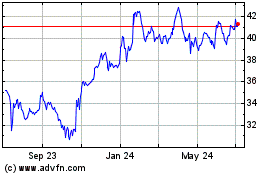By Ryan Knutson
Not long after the 2000 merger that formed Verizon
Communications Inc., Denny Strigl rushed to Boston to talk wireless
employees out of joining a union.
"We fought it tooth and nail," said Mr. Strigl, who ran
Verizon's wireless operations until retiring in 2009. "There's a
mentality that builds up in a unionized workforce that pits the
union against its management. And that's not the kind of culture
that you want in a new startup."
The episode was one of many over the years in which Verizon
sought to keep unions out of its fast-growing wireless
business.
The result: the company has avoided work stoppages at operations
that employ about 75,000 and generated about two-thirds of its $132
billion in revenue last year.
Of the nearly 40,000 Verizon employees who went on strike April
13, only about 160 worked for the company's wireless unit.
And, as the company's landline business has shrunk, so too has
unions' influence on it.
Last week, the company made what it called its best and final
contract offer. Union leaders said the strike would continue.
"We state upfront, if you want to join a union you can join a
union," said Marc Reed, Verizon's chief administrative officer. "At
the end of the day, people have chosen not to."
Part of the reason is history. Verizon's landline business
sprang out of the Baby Bells, and has been unionized for decades,
while its wireless division was formed in 1995 as a separate joint
venture. The wireless unit has contracted out most of its
construction work and many of its employees are retail clerks.
The number of Americans working in the telecom industry has been
shrinking -- to about 880,000 in 2015 from more than a million a
decade ago -- but union jobs have disappeared even faster.
About 13% of U.S. telecommunications workers were union members
last year, down from 21% in 2005, according to the Labor
Department. The last strike of the Ma Bell era, in 1983, involved
roughly 675,000 workers.
AT&T Inc. is the only major U.S. carrier with a significant
union presence in its wireless division. More than 125,000, or
about 45% of AT&T's overall workforce, are unionized.
None of Sprint Corp.'s roughly 30,000 employees are union
members. T-Mobile US Inc. has about 30 unionized workers out of
50,000. All four carriers rely on contractors to build and maintain
cell towers.
The Communications Workers of America has tried several times to
penetrate Verizon's wireless workforce.
In 2000, when about 85,000 landline workers went on strike, the
union pushed for an arrangement called card-check neutrality;
Verizon agreed, helping to end the strike after 18 days.
Under such deals, a company agrees to automatically recognize a
union if a majority of workers sign cards authorizing one to
represent them.
The card-check system was used by unions to expand at
AT&T.
At Verizon, the two sides fought for more than a year about the
details of the deal. By the time the issues were finally resolved,
the union says it didn't have much time to organize before the
agreement expired.
"That agreement was totally useless," said Ed Sabol, a
now-retired CWA official who tried to organize the Verizon workers.
"The employees never had the ability to make that decision free of
incredible fear."
Mr. Strigl said it was employees who made the choice. "We worked
hard to give employees the pay and benefits that didn't cause them
to want to have to join the union," he said.
The 350-person call center near Boston where Mr. Strigl spoke
with wireless employees was closed in 2001 as part of an overhaul
to Verizon's call center operations.
Verizon settled allegations that year by the CWA that it
threatened workers. The company neither admitted nor denied any
wrongdoing.
"Runaway call centers send a message to everyone else: You try
to organize a union, and you can kiss your job goodbye," said Steve
Early, a retired CWA official.
The CWA says it was working in 2004 to win over wireless call
centers in Orangeburg, N.Y., and in Morristown, N.J., with about
1,700 employees when Verizon moved the operations to less union
friendly Southern states.
The company said the old locations couldn't accommodate the
necessary growth, and that other states offered better business
incentives.
The carrier offered displaced employees a package including
$10,000 to relocate.
Mr. Reed, Verizon's administrative chief, said the call centers
were moved for business reasons, and not because of the union.
"We would rather be able to deal directly with our employees and
communicate the way in which our culture says, as opposed to have
to follow some bureaucratic legacy approach to dealing with
employees," Mr. Reed said.
The union has a toehold at Verizon Wireless. About 100 wireless
technicians joined the CWA more than a decade ago.
In 2014, employees at six Brooklyn, N.Y., stores and one in
Everett, Mass., joined CWA. Those employees are still negotiating
with Verizon for their own contract.
Bianca Cunningham, a worker who helped organize the Brooklyn
stores, says without a union, it can take years to earn meaningful
wage increases. "We were just trying to fight for ourselves and see
some changes," she said.
In September, Ms. Cunningham was fired.
Verizon told the National Labor Relations Board she was
terminated because of her "failure to be honest and forthcoming"
during a code-of-conduct investigation.
Ms. Cunningham claimed it was because she helped organize
workers.
Regional NLRB director James Paulsen filed charges against
Verizon in the case, which is pending before an administrative law
judge.
Write to Ryan Knutson at ryan.knutson@wsj.com
(END) Dow Jones Newswires
May 01, 2016 20:19 ET (00:19 GMT)
Copyright (c) 2016 Dow Jones & Company, Inc.
Verizon Communications (NYSE:VZ)
Historical Stock Chart
From Mar 2024 to Apr 2024

Verizon Communications (NYSE:VZ)
Historical Stock Chart
From Apr 2023 to Apr 2024
